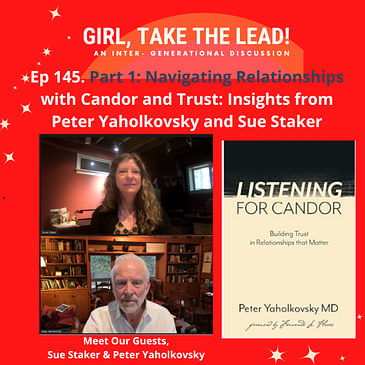Peter Yaholkovsky and his partner in life, Sue Staker, Boomers, join Yo to discuss Peter’s book, Listening for Candor: Building Trust in Relationships that Matter, which illuminates a path for trust conversations by starting with a shared sense of what matters. Peter has an extensive background in the linguistic foundations of trust and communication, having studied and worked with Dr. Fernando Flores since the 1980's and being certified by the Strozzi Institute as a Master Somatic Coach. Over the past three decades, Peter has coached families and executive teams in building and restoring trust. In addition to being life partners for 25 years, Peter and Sue worked together as part of the Williams Group team to bring trust building skills to wealthy families.
Topics covered in this 2-part series: What is candor and how can it build trust with others? What is the role that emotionality and intention play in relationships? How does trust differ in personal and professional settings? What does power have to do with listening with candor? What elements need to be present to “save” a relationship and when to let it go?
3 takeaways from the series:
The “truth” of Candor is sincerity about one’s intention and care—about ‘what matters’—a departure from speaking “honestly” or being “right” about the past.
Sincere engagement is to want to understand another more fully.
Vulnerability to a power differential can wreak havoc in conversations when “what matters” is protecting oneself from the risks of engagement.
As Mentioned:
Peter’s book:
Listening for Candor: Building Trust in Relationships that Matter
The Williams Group:
https://www.thewilliamsgroup.org/
Dr. Fernando Flores: https://conversationsforaction.com/fernando-flores Strozzi Institute: https://strozziinstitute.com/
More About Peter & Sue:
Prior to his consulting career, Peter practiced Internal Medicine as a Board Certified Internist after graduating from Stanford University and UC Davis Medical School. Sue has done executive coaching for some 20 years.
How to Reach Peter & Sue: The contact link at peter-yaholkovsky.com (Website)
How to Reach Yo Canny:
Our website: www.girltaketheleadpod.com
You can send a message or voicemail there. We’d love to hear from you!
email:
yo@yocanny.com (Yo)
FB group: Girl, Take the Lead
https://www.facebook.com/groups/272025931481748/?ref=share
IG: yocanny (Yo)
LinkedIn:
https://www.linkedin.com/in/yocanny/





